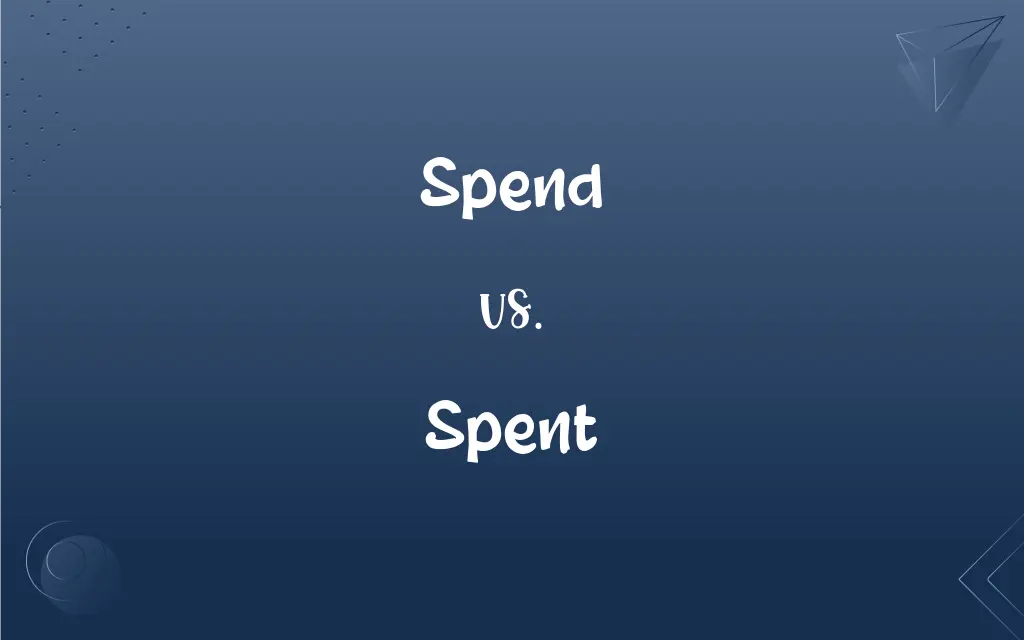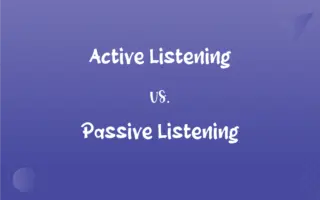Spend vs. Spent: What's the Difference?
Copy edited by Janet White || By Harlon Moss || Updated on October 2, 2023
"Spend" is the base form of the verb meaning to use money to pay for something, while "spent" is its past tense and past participle form, indicating the action has already occurred.

Key Differences
"Spend" operates as a verb in the present tense, suggesting an ongoing or future action related to using money or time. Conversely, "spent" signifies that the action of using money or time has already taken place in the past.
When someone mentions they "spend" their money on a hobby, it denotes a continuous or regular action. On the other hand, if they "spent" their money, it conveys that the action was completed previously.
Understanding the difference between "spend" and "spent" is crucial for mastering tense in English. "Spend" aligns with present scenarios, while "spent" reflects past circumstances.
If you're unsure about when to use "spend" versus "spent", consider the timeline of the action. Is it happening now or in the future? Use "spend". Did it already occur? Use "spent".
Both "spend" and "spent" can relate to more than just money; they can also refer to expending time, effort, or other resources. Whether someone "spends" time reading or "spent" the day at the beach, the verb's form signals the action's timing.
ADVERTISEMENT
Comparison Chart
Tense
Present
Past
Usage
Ongoing or future action
Action that has already occurred
Function in Sentence
Base form of the verb
Past tense and past participle form of the verb
Examples
"I spend my weekends hiking."
"I spent my vacation in Spain."
Related to
Money, time, effort, or other resources in present
Money, time, effort, or other resources in the past
ADVERTISEMENT
Spend and Spent Definitions
Spend
To use time doing something or being somewhere.
I love to spend my evenings reading.
Spent
Denoting effort or energy already expended on a task.
He spent his energy on the first part of the race.
Spend
To allow (time) to elapse.
We spend hours talking about our dreams.
Spent
Having lost freshness or vigor; worn-out.
By evening, I felt completely spent.
Spend
To use money to pay for something or someone.
I spend too much on coffee every week.
Spent
Used in the past tense, indicating money was given in exchange for something.
She spent all her savings on the trip.
Spend
To exhaust or use up a resource.
The project will spend most of our budget.
Spent
Referring to time that has already passed while doing a specific activity.
They spent three weeks in Europe.
Spend
To pass or go through, especially in a way considered wasteful.
He tends to spend his days doing nothing.
Spent
Used up; exhausted.
The fuel is all spent.
Spend
To use up or put out; expend
Spent an hour exercising.
Spent
Past tense and past participle of spend.
Spend
To pay out (money).
Spent
Having been put to use and therefore unavailable for use
Spent shell casings.
Spend
To wear out; exhaust
The storm finally spent itself.
Spent
Depleted of energy, force, or strength; exhausted
Spent laborers.
Spend
To pass (time) in a specified manner or place
Spent their vacation in Paris.
Spent
Depleted or nearly depleted of fissionable material
Spent nuclear fuel.
Spend
To throw away; squander
Spent all their resources on futile projects.
Spent
Consumed, used up, exhausted, depleted.
A spent cartridge
FAQs
Can "spend" be used as a noun?
No, "spend" is a verb. The noun form related to it is "spending."
Can "spent" be used without mentioning when the action occurred?
Yes, "spent" can be used without specifying the time if it's clear from the context.
Can "spent" be used to start a sentence?
Yes, "spent" can start a sentence, e.g., "Spent money is gone forever."
Is "spending" the continuous form of "spent"?
No, "spending" is the continuous form of "spend."
Can "spend" and "spent" be used interchangeably?
No, "spend" is used for present and future actions, while "spent" is used for past actions.
What is the function of "spend" in a sentence?
"Spend" is a verb that describes the action of using up money or time.
Can "spend" and "spent" be used in passive sentences?
Yes, e.g., "Money was spent by him" or "Money will be spent tomorrow."
What follows "spend" in a sentence structure?
"Spend" is usually followed by an object and sometimes an amount, e.g., "I spend [amount] on [object]."
Which is correct: "I will spend" or "I will spent"?
"I will spend" is correct because "will" requires the base form of the verb.
Is it correct to say "I spend time yesterday"?
No, the correct form is "I spent time yesterday" since it is a past action.
Can "spent" refer to non-monetary actions?
Yes, "spent" can refer to expending any resource, like time or energy.
What is the negative form of "spend"?
"Do not spend" or "don’t spend" in the present, and "did not spend" or "didn’t spend" in the past.
What kind of verb is "spend"?
"Spend" is a regular transitive verb.
Can "spend" be used in a future continuous tense?
Yes, e.g., "I will be spending money on groceries."
What is the basic difference between "spend" and "spent"?
"Spend" is the present and future tense verb, and "spent" is its past tense and past participle form.
Which is correct: "time is spent" or "time is spend"?
"Time is spent" is correct because "is" requires a past participle.
Can "spent" describe physical exhaustion?
Yes, e.g., "After the run, I was completely spent."
Can "spend" and "spent" be used in the same sentence?
Yes, e.g., "I spend wisely because I have spent unwisely before."
Does "spent" always refer to action in the distant past?
No, "spent" can refer to any past action, whether recent or distant.
Is "spend" always related to monetary contexts?
No, "spend" can also relate to utilizing other resources like time or energy.
About Author
Written by
Harlon MossHarlon is a seasoned quality moderator and accomplished content writer for Difference Wiki. An alumnus of the prestigious University of California, he earned his degree in Computer Science. Leveraging his academic background, Harlon brings a meticulous and informed perspective to his work, ensuring content accuracy and excellence.
Copy edited by
Janet WhiteJanet White has been an esteemed writer and blogger for Difference Wiki. Holding a Master's degree in Science and Medical Journalism from the prestigious Boston University, she has consistently demonstrated her expertise and passion for her field. When she's not immersed in her work, Janet relishes her time exercising, delving into a good book, and cherishing moments with friends and family.































































